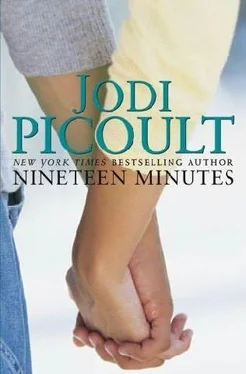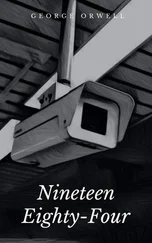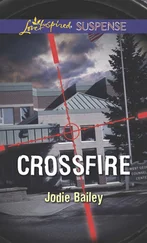In the hallway, Patrick leaned against the wall and closed his eyes. Jesus Christ. Was this what he’d have to put every one of his witnesses through? He was about to apologize to the judge for upsetting Josie when she turned on him just like her daughter had. “What the hell do you think you’re doing, telling her about Matt!”
“You asked me to,” Patrick bristled.
“To tell her about the school,” the judge qualified. “Not to tell her her boyfriend’s dead!”
“You know damn well Josie would have found out sooner or-”
“Later,” the judge interrupted. “Much later.”
The nurses appeared in the doorway. “She’s sleeping now,” one of them whispered. “We’ll be back in to check on her.”
They both waited until the nurses were out of hearing range. “Look,” Patrick said tightly. “Today I saw kids who’d been shot in the head, kids who will never walk again, kids who died because they were in the wrong place at the wrong time. Your daughter…she’s in shock…but she’s one of the lucky ones.”
His words hit her, a solid slap. For just a moment, when Patrick looked at the judge, she no longer seemed furious. Her gray eyes were heavy with all the scenarios that, thankfully, had not come to pass; her mouth softened with relief. And then, just as suddenly, her features smoothed, impassive. “I’m sorry. I’m not usually like this. It’s just…been a really awful day.”
Patrick tried, but he could see no trace left of the emotion that had, for a moment, broken her. Seamless. That’s what she was.
“I know you were only trying to do your job,” the judge said.
“I would like to talk to Josie…but that’s not why I came. I’m here because she was the first one…well, I just needed to know she was all right.” He offered Judge Cormier the smallest of smiles, the kind that can start a heart to breaking. “Take care of her,” Patrick said, and then he turned and walked down the hall, aware of the heat of her gaze on his back, and how much it felt like the touch of a hand.
Twelve Years Before
On his first day of kindergarten, Peter Houghton woke up at 4:32 a.m. He padded into his parents’ room and asked if it was time yet to take the school bus. For as long as he could remember, he’d watched his brother Joey get on the bus, and it was a mystery of dynamic proportion: the way the sun bounced off its snub yellow nose, the door that hinged like the jaw of a dragon, the dramatic sigh when it came to a stop. Peter had a Matchbox car that looked just like the bus Joey rode on twice a day-the same bus that now he was going to get to ride on, too.
His mother told him to go back to sleep until it was morning, but he couldn’t. Instead, he got dressed in the special clothes his mother had bought for his first day of school and he lay back down in bed to wait. He was the first one downstairs for breakfast, and his mother made chocolate chip pancakes-his favorite. She kissed him on the cheek and took a picture of him sitting at the breakfast table, and then another one when he was dressed in his coat and had his empty knapsack on his back, like the shell of a turtle. “I can’t believe my baby is going to school,” his mother said.
Joey, who was in first grade this year, told him to stop acting stupid. “It’s just school,” he said. “Big deal.”
Peter’s mother finished buttoning his coat. “It was a big deal to you once, too,” she said. Then she told Peter she had a surprise for him. She went into the kitchen and reappeared with a Superman lunch box. Superman was reaching forward, as if he were trying to break out of the metal. His whole body stuck out from the background the tiniest bit, like the letters on books blind people read. Peter liked thinking that even if he couldn’t see, he would be able to tell that this was his lunch box. He took it from his mother and hugged her. He heard the thud of a piece of fruit rolling, the crinkle of wax paper, and he imagined the insides of his lunch, like mysterious organs.
They waited at the end of the driveway, and just as Peter had dreamed over and over, the yellow bus rose over the crest of the hill. “One more!” his mother called, and she took a picture of Peter with the bus groaning to a stop behind him. “Joey,” she instructed, “take care of your brother.” Then she kissed Peter on the forehead. “My big boy,” she said, and her mouth pinched tight, the way it did when she was trying not to cry.
Suddenly Peter felt his stomach turn to ice. What if kindergarten was not as great as he’d imagined? What if his teacher looked like the witch on that TV program that gave him nightmares sometimes? What if he forgot which direction the letter E went and everyone made fun of him?
With hesitation, he climbed the steps of the school bus. The driver wore an army jacket and had two teeth missing in the front. “There’s seats in back,” he said, and Peter headed down the aisle, looking for Joey.
His brother was sitting next to a boy Peter didn’t know. Joey glanced at him as he walked by, but didn’t say anything.
“Peter!”
He turned and saw Josie patting the empty seat next to her. She had her dark hair in pigtails and was wearing a skirt, even though she hated skirts. “I saved it for you,” Josie said.
He sat down next to her, feeling better already. He was riding inside a bus. And he was sitting next to his best friend in the whole world. “Cool lunch box,” Josie said.
He held it up, to show her the way that you could make Superman look like he was moving if you wiggled it, and just then a hand reached across the aisle. A boy with ape arms and a backward baseball cap grabbed the lunch box out of Peter’s grasp. “Hey, freak,” he said, “you want to see Superman fly?”
Before Peter understood what the older boy was doing, he opened a window and hurled Peter’s lunch box out of it. Peter stood up, craning his neck around to see out the rear emergency door. His lunch box burst open on the asphalt. His apple rolled across the dotted yellow line of the road and vanished beneath the tire of an oncoming car.
“Sit down!” the bus driver yelled.
Peter sank back into his seat. His face felt cold, but his ears were burning. He could hear the boy and his friends laughing, as loud as if it were happening in his own head. Then he felt Josie’s hand slide into his. “I’ve got peanut butter,” she whispered. “We can share.”
Alex sat in the conference room at the jail, across from her newest client, Linus Froom. This morning, at 4:00 a.m., he’d dressed in black, pulled a ski mask over his head, and robbed an Irving gas station convenience store at gunpoint. When the police were called in after Linus ran off, they found a cell phone on the ground. It rang while the detective was sitting at his desk. “Dude,” the caller said. “This is my cell phone. Do you have it?” The detective said yes, and asked where he’d lost it. “At the Irving station, man. I was there, like, a half hour ago.” The detective suggested that they meet at the corner of Route 10 and Route 25A; he’d bring the cell phone.
Needless to say, Linus Froom showed up, and was arrested for robbery.
Alex looked at her client across the scarred table. Her daughter was at this moment having juice and cookies or story time or Advanced Crayoning or whatever else the first day of kindergarten consisted of, and she was stuck in a conference room at the county jail with a criminal too stupid to even be good at his craft. “It says here,” Alex said, perusing the police report, “that there was some contention when Detective Chisholm read you your rights?”
Linus lifted his gaze. He was a kid-only nineteen-with acne and a unibrow. “He thought I was dumb as shit.”
“He said this to you?”
Читать дальше












